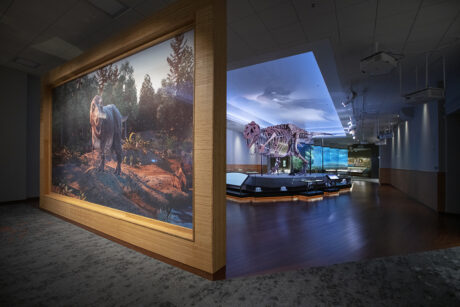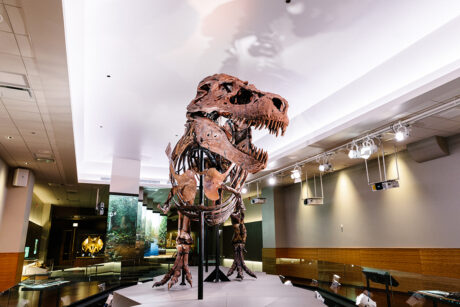
MIDDLETON, WI – Sue the T. Rex is the Lady Gaga of the dinosaur community. The magnificent murderbird (a favorite term to describe the T. Rex) has an often-hilarious Twitter feed, legions of adoring fans, and a brand new home in the Chicago Field Museum’s Griffin Halls of Evolving Planet. Lighting and AV presentation for Sue’s new home were designed by Lightswitch Chicago, using ETC and Xicato luminaires, and ETC controls.
More details from ETC (www.etcconnect.com):
Although the fossil is named after Sue Hendrickson, who discovered the skeleton in South Dakota in 1990, Sue the T.Rex may not even be female. (They use the pronouns they/them/their.) This is just one of the facts learned about Sue since their discovery and exhibition at the Field Museum in 2000.
Sue’s move to their own 5,000-square-foot area, The Griffin Halls of Evolving Planet, was completed months ahead of schedule to satisfy a clamoring public. Following a three-month prototyping phase to show the curators how Sue would be lit in their new quarters, the design team at Lightswitch Chicago produced a meticulously cued AV presentation worthy of the world’s most expensive ($8.7 million) fossil.

“Conservation of the delicate stones and resins is very important – Sue will receive about a quarter of the light, and none of the direct sunlight, they did before,” says Thatcher Waller, Senior Lighting Designer for Lightswitch Chicago.
The project called for the complex integration of control protocols and diverse fixture types including ETC Source Four LED Series 2 and ColorSource fixtures, as well as fixtures from another vendor, Xicato, that are wirelessly controlled using DMX over Bluetooth. System Integrator Ivan Jones expected a “sandstorm” but was pleasantly surprised. “ETC did special programming for the job. Chris Price wrote an entire new control module inside Mosaic to speak to Xicato. They handed me a product that worked – I never had to patch it.”
In fact, this is the world’s first execution of the interoperability between ETC Mosaic and Xicato Controls. “We believe interoperability between control systems is essential as we move into the IoT age of lighting,” says Ron Steen, VP of NA Specification Sales for Xicato. “Our open API has allowed ETC to harness the benefits of our system in concert with Paradigm and Mosaic.”
The Control Stream
The heart of the AV system is an ETC Mosaic controller playing an unusual role. “For Sue, Mosaic is acting as the switchboard instead of the commander. It does not make a single decision on its own. It is being commanded by both Watchout and AMX. It provides feedback to AMX while acting as the integration point to Xicato wireless lighting and Paradigm,” explains Jones.
A Mosaic MSC1 controller handles all inbound commands, controls DMX lights related to Sue’s scenic lighting, and recalls presets in the Xicato Wireless Bluetooth lights. Mosaic accesses the Xicato Control network to recall scenes and fade the house lights up or down based on cues starting or ending the theatrical presentation.
The Xicato Control solution features a Bluetooth Low Energy (BLE) wireless protocol. Names, groups and scenes were set in the Xicato individually addressable modules. When asked about using DMX over Bluetooth, Waller merely replies “Why run a bunch control wires to all the fixtures if I don’t have to?”
ETC Paradigm handles all the white house lights that operate on standard relays or dimmers and also provides control stations for temporary override.
A Day in the Life
No longer free to roam the Badlands, Sue’s daily schedule is carefully regulated.
Their day begins in an overnight look. Most of the lighting in the space is off except for strategically-placed security lighting to allow safe path finding and camera illumination.
AMX starts the day with a TCP command telling Mosaic to go to the normal gallery look. Mosaic passes a message to Paradigm to go to the normal show presets. Then Mosaic’s instructions come from Watchout as TCP messages as it starts the multimedia show. Watchout will cycle through a series of commands that pull up various triggers as the show repeats every fifteen minutes.
At the end of the day, AMX instructs Mosaic to enter the gallery security look and tells Watchout to stop sending messages to Mosaic. The monotony of Sue’s life is broken by the occasional special event where they become the center of attention. This calls for a look with lots of party lighting, all under the watchful eye of Mosaic.
“The museum was concerned about allowing a color picker because it seemed likely that we would exceed the maximum light threshold for preservation,” explains Jones. “To ease their concerns, Mosaic automatically reduces the output to a safe level limit whenever a color picker command is received. When a normal preset is recalled, Mosaic automatically removes the intensity setback and resumes everyday functions.”
Sue’s new home has been a huge hit with their legion of fans. Waller attributes the success of the exhibit to the way in which technology was used. “The use of theatrical fixtures control the focus on different parts of Sue, making them appear more life-like,” Waller shares. “We created drama through fixtures that excite the audience, encourage them to use their imaginations, and share the amazing story of Sue.”


